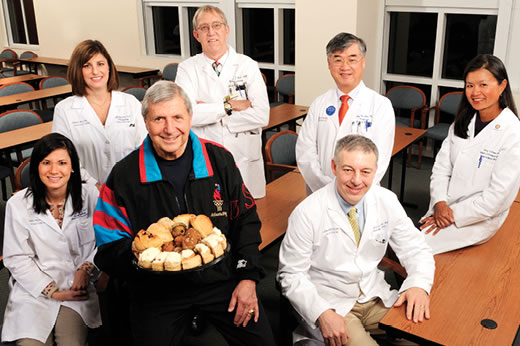The sun shows no signs of rising on this rainy February morning, and the streets are nearly bare. A drive down Clifton Road from the CDC to Winship takes two minutes flat, even after a red light or two snags you. Buses and shuttles are rare, and valet parking hasn't opened.
So it's a little surprising to walk into the boardroom on the fifth floor of Winship Cancer Institute to find a hive of activity and conversation.
About 50 doctors, nurses, and other members of Winship's head and neck cancer team are wide awake and in full work mode, long before they will dash off to their clinics, operating rooms, labs, and offices to begin a full day's work there.
It's the head and neck program's tumor board meeting, and it happens every Tuesday at 6:30 a.m. This team of experts comes from surgery, radiation and medical oncology, pathology, radiology, nutrition, nursing, social work and speech pathology. They will discuss every head and neck cancer patient seen in the past week before they leave.
While it may not be enough to rouse the average person out of bed at 5 a.m., those in attendance wouldn't want to miss it. They know their collaboration makes a difference in their patients' lives and that it helps improve treatment.
"We present every single patient —including those seen at Emory Midtown and the VA Medical Center —to make the best decision for patient care," says Dong Moon Shin, associate director of Winship and director of the head and neck cancer program at Winship. Even patients whose cancer may not appear to be life-threatening can have "major complications, major issues," that physicians bring to the tumor board to discuss, explains Shin, a medical oncologist.
And this is not just any tumor board—it's a working board of more than four dozen experts.
"There's a lot of experience in that room," says Jonathan Beitler, a radiation oncologist who specializes in head and neck cancers. "It's a good way to see the same evidence at the same time. There are decades of surgical experience in the room. It's a great way to provide patients the very best care."
Preparation and organization are key, says Nabil Saba, a medical oncologist who specializes in head and neck cancers. "It's become an example of what a multi-disciplinary care program can be."
Other tumor boards meet at Winship, and they all have patient care as the primary focus. The head and neck tumor board meeting may be one of the best examples, however, of the interdisciplinary work that sets Winship apart—and helps ensure that patients receive the benefit of expertise from several disciplines.
Collaboration is becoming more and more key in unlocking cancer's dark secrets. Winship is known for collaboration across disciplines and within departments; Winship's deputy director, Fadlo R. Khuri, has said that a willingness to collaborate is a job requirement.
"The thing that we always remember is that we are here for the patients, not for ourselves," says Khuri. "The head and neck cancer team is an outstanding example of brilliant scientists and clinicians coming together toward one common goal—helping our patients get well, with minimal side effects."
It's easy to see what Khuri is talking about when trying to interview and photograph members of the head and neck cancer team. Shin doesn't want to leave anyone out and recites from memory the entire team and each of their responsibilities, excitedly talking about each one. When it's time for a photo shoot, he wants to try to get everyone in the picture.
"This is one of the largest interdisciplinary tumor boards anywhere in the nation," explains Shin. "Patients are receiving the best of care from the best of the experts. And that care is enhanced because we have so many committed members of the treatment team who come together with great knowledge and great compassion to make sure our patients are getting the best care possible."
Winship's head and neck cancer program stands out not only because of exceptional patient care but also because it is one of only five in the country to be designated a Head and Neck Cancer Specialized Program of Research Excellence, or SPORE. "We are very proud to have established such a prestigious program at Winship, and it's also the only SPORE in the state of Georgia," says Shin. SPORE grants are funded by the National Cancer Institute and bring with them about $2.5 million in research funding each year for five years. The research program is very comprehensive, consisting of four major programs, research shared resources, a career development program, and a developmental research program.
In a state and region where head and neck cancer rates are higher than the national average, the head and neck cancer program is a critical piece of Winship's efforts.

